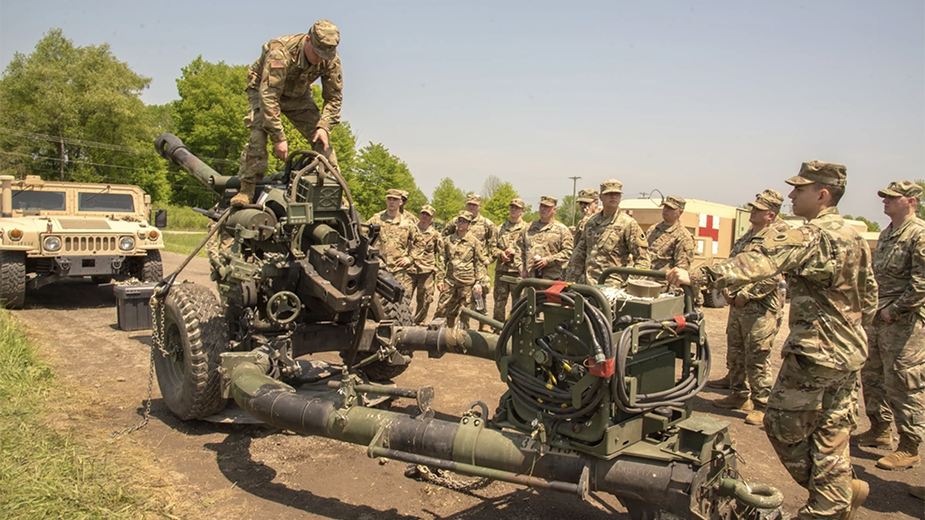VIENNA, Ohio – The two military assets in the region aren’t top-of-mind concerns for the general public, but the economic impact Youngstown Air Reserve Station and Camp James A. Garfield Joint Military Training Center represent is unmistakable, exceeding $160 million in fiscal year 2021.
The Air Force reserve station, often referred to as YARS, shares runways with Youngstown-Warren Regional Airport in Vienna Township and is the largest employer in Trumbull County and third largest in the Mahoning Valley.
The air base has some 1,800 active duty, reserve and civilian personnel, and had an economic impact of $150.5 million during fiscal 2021, according to the most recent summary of its assets, personnel and spending.
The YARS economic impact figure includes $79.59 million in direct payroll and $56.57 million in indirect payroll. Direct expenditures and their indirect impact total $15.45 million. Local economic spinoff from YARS includes reservists eating at local restaurants and staying at area hotels.
The 910th Airlift Wing, which is stationed at YARS, provides tactical airlift support, transporting supplies and troops to the frontlines, and agile combat support, supplying everything from security forces to civil engineers where they’re needed.
“We also have a medical contingency,” says Col. Jeff Van Dootingh, installation commander and commander of the 910th Airlift Wing. “Our base sent some of the first medical experts into the fight against COVID when the pandemic first hit New York and other hot spots.”
And the 910th has the only fixed-wing aerial spray component in the Department of Defense.
Camp Garfield is partially in Newton Falls and Ravenna in neighboring Portage County.
Up until 2007, the focus at Camp Garfield, which was previously known as the Ravenna Arsenal, was on cleaning up the infrastructure there related to manufacturing ammunition. It then was converted to an Ohio National Guard training base that also is used by surrounding states’ National Guard and armed forces reserve units.
“It allows the units to train to facilitate their state and federal missions,” says Lt. Col. Brian Crock, acting base operations supervisor.
Camp Garfield reported a $15.19 million budget for fiscal 2021, according to Stephanie Beougher, public information officer for the Ohio National Guard.
The camp has a full-time staff of about 100, Crock says. About 60,000 personnel – among them officers from law enforcement agencies including the FBI – use it for training. As many as 1,800 train there at one time.
“We have a live fire shoot house and our one range is put together so it’s a fire and movement range,” Crook says. The camp also has an area that can be set up for training to handle riot situations.
Those using Camp Garfield for training typically stay in on-site barracks and eat there, although meals are catered using local vendors, he says. The camp follows the same requirements as the active-duty Army with regard to purchasing.
“We patronize a local vendor if at all possible because we like to support the local economy as much as we’re allowed to and afforded to,” Crook says.
Vito Abruzzino, executive director of the Eastern Ohio Military Affairs Commission, says the region’s military assets have gained public recognition as economic assets.
The commission, a nonprofit fund of the Community Foundation of Western PA and Eastern Ohio, was created after YARS lost four C-130 aircraft and a flying squadron. It advocates for YARS and Camp Garfield both in Columbus and Washington, D.C.
When EOMAC was formed in 2015, YARS’s economic impact was estimated at $89 million, Abruzzino says. It has been as high as around $200 million.
“In this day and time, if you don’t have constant boots on the ground, trying to get legislation in place, budgets in place or appropriations to support your military needs, you’re going to be behind because everybody else who has military assets in their community is doing that,” says Dave Christner, president of the EOMAC board of directors.
Abruzzino also notes the state of Ohio until recently was “a little late catching religion” in terms of providing support to promote the military assets across the state but now has caught up with states like Texas, Florida and Alabama.
One of EOMAC’s current priorities, having successfully lobbied to secure funding for eight new C-130J aircraft, is getting those planes stationed at YARS, Christener says. Funds recently were approved to improve the assault runway at YARS, and the group also is looking for support for other runway and instrument landing improvements.
EOMAC also has successfully lobbied for new firing ranges at Camp Garfield and is working on securing funding to install a dirt strip for C130s and C17s to practice on. Currently, the closest such practice strip is in North Carolina.
Having to practice there for dirt strip landings means “a lot of time, a lot of gas, a lot of inefficiency” for aircraft stationed at YARS, Christener says. Installing a strip at Camp Garfield would make it “kind of the primary training location for C130s and C17s in the northeast United States,” he says.
In recent years, Camp Garfield began construction of a new cantonment area, Crock reports. Also, the multipurpose machine gun range at the center of the post is getting a $7.6 million upgrade that should be done by late spring or early summer 2023.
YARS is preparing to embark on the long-planned construction of a new $8.8 million main entrance gate, which also will include a state-of-the art inspection facility.
Construction of the gate will take about 18 months, Van Dootingh reports. Once completed, it will provide better security for the base as well as for the reservists who come in every weekend.
Pictured: At Camp James A. Garfield near Newton Falls, Sgt. Cyle Schenkel, with 1st Battalion, 134th Field Artillery Regiment, trains soldiers on preparing artillery pieces for sling load transportation. Sling load training is performed to increase soldier readiness for the full spectrum of Army operations. Photo by Spc. Anjelo Pina.
